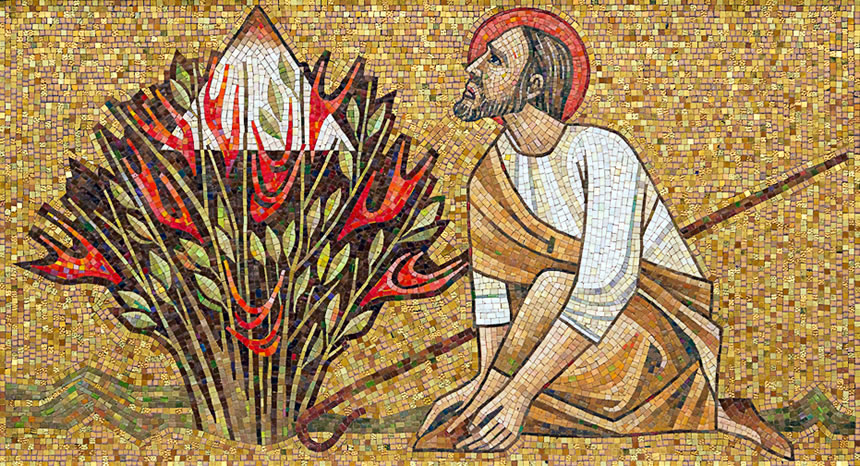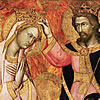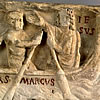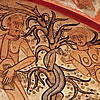God's Holy Name
This article is a commentary on Exodus 3:1-15.
We have to remember that the time of Moses was polytheistic – people worshipped many gods – and it was natural for them. So when God asked Moses to do things, he naturally wanted to know which god was talking to him. The interesting thing is that God doesn’t give his name, but his nature: “I Am who Am” or“YHWH" in Hebrew.
Theologians like to explain that once you give your name, someone can call on you. When you have someone’s name, for example, you can call his or her attention by calling his or her name. It gives you a certain “power” over that person. But God is all powerful and, therefore, we should not have any “power” over him, thus, he doesn’t give us his name.
What he gives us, instead, is his nature. By saying, “I Am who Am” he is telling us that it is his nature to be. In short he is existence itself. By this “name” he reveals his eternal nature where he had no beginning and will have no end. He is existence itself, and the source of all existence, but he did not give himself existence – he just always was. Saint Thomas Aquinas said it so eloquently: God is “the sheer act of being itself.”
By revealing his nature, he tells us that he is THE God if everything owes their existence to him. If there are no other gods that can rival that, then that would mean there are no other gods: he is the only one worthy of that title. This is why we attribute all acts of life (existence) as God’s prerogative. Once we understand God’s holy “name” we can then understand why Catholics shy away from playing god by deciding who lives or dies. This means any unnatural way of conceiving is taking away God’s prerogative for life. It also means that killing anyone born or yet unborn removes God’s prerogative for taking the life that he gave. By doing these things, we make ourselves “god” and that, in essence, is what sin is about, isn’t it?
The Hebrews respected God’s name using very extreme means. In order to avoid going against the second commandment to not use the holy name of God in vain, they changed all the instances of “YHWH”, in holy scripture, into “Lord”. It was a way to show reverence in his name and all that it meant. This, of course, we inherited as Christians, but the New Testament helps us understand more of God’s name. The Gospel of Matthew tells us:
She will bear a son and you are to name him Jesus, because he will save his people from their sins. Matthew 1:21
To put this in context, Joseph found out Mary was with child, and in a dream, an angel reassures him that her son is from God, and instructs him what name he is to give it.
Just to side track a little bit, In Jewish tradition, the Father is the one who gives a name during circumcision. By doing so, a man publicly announces that the child is his and he is the child’s father. So by giving a name to Mary’s son, Joseph becomes Jesus’ father, and Jesus becomes his son in a real sense. So although Joseph is not the biological father of Jesus, by giving him a name, he “adopts” him in a very real fatherly sense. Since Joseph is from the royal line of David, by doing this Jesus inherits this lineage so he can be called, "Son of David.” This should give us some insight about baptism (which St. Paul replaces circumcision in Colossians 2:11-12) that when God gives us a name, he is adopting us in a very real sense. We, through baptism, become real children of God. And as Jesus inherits the lineage of Joseph, we too inherit the “divine lineage” of God as a gift from him. This means that through baptism sanctifying grace is restored and we share in God’s divinity. (We remember that the minister is not the one giving us a name, but he is a proxy for God. The words, “I baptize you in the name of the Father, and of the Son, and of the Holy Spirit” indicate that he is a“stand-in" for God.
Going back to God’s name, it is revealed by the angel that the child of Mary should be named “Jesus”. The angel indicates why: because he will save his people. We are told that in Hebrew the name “Jesus” means “God Saves.” However a more literal translation is “I Am Saves.” Pope Benedict XVI, in his book Jesus of Nazareth: The Infancy Narratives says that God is completing his Old Testament “name.” It, therefore, links the Old Testament with the New.
This gives us a new perspective on God then, as revealed by him. He is not just an almighty eternal being, but a merciful one, too. We have to remember this every time we mention the name of Jesus in our prayers.
Image from the original photography of Mark Scot Abeln entitled Resurrection Cemetery, in Affton, Missouri, USA - mosaic of Moses and the Burning Bush. https://www.flickr.com/photos/msabeln/5499571493/ Photo is cropped for use in this article.
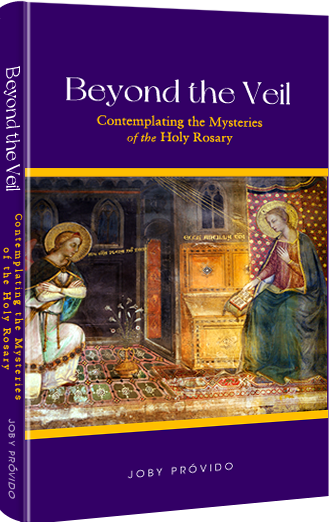
Beyond the Veil
Contemplating the Mysteries of the Holy Rosary
Prayer giants like Pope St. John Paul II, Pope Paul VI, Bl. Archbishop Fulton Sheen, and Bishop Robert Baron advocate that we contemplate on the mysteries of the rosary while we say the vocal prayers. Unfortunately, there are not many books that teach us how to do this. Beyond the Veil comes to the rescue by suggesting seven ways we can pray the rosary the way it was intended.
The larger part of the book offers mental images for each of the mysteries we can use in our contemplation, for how can we imagine the scenes in the rosary if we don't know about them?
Get your copy now either in Hardbound, Paperback, or Kindle

Typology for Beginners
A Catholic Perspective on understanding the New Testament through the Old Testament
First-century Jews converted to Christianity in droves because of the way the New Testament was written to show Jesus was the Messiah promised by the Old Testament. We also learn about how Mary is the New Eve and the Ark of the Covenant in the way the writers portray her.
Through typology, the patterns that connect the Old and New Testaments make the Bible stories more accessible so that one becomes excited to read Sacred Scripture again.
Get your copy now either in Hardbound, Paperback, or Kindle

A Sky Full of Stars
Know Our Lady through her Titles in the Litany
The Church helps us understand who Mary is by honoring her with different titles in the Litany of the Blessed Virgin Mary. Unfortunately, over time and difference of culture, we might not grasp what it is the Church is ascribing to her and lose that opportinity to get to know her.
In A Sky Full of Stars, each title of the Litany is explained so we get know Mary more and fall in love with her all over again.
Get your copy now either in Hardbound, Paperback, or Kindle

100 Things Every Catholic Should Know
Whether or not you are new to the Catholic Church, or struggling, or lapsed, or dynamically involved, this book will enlighten you with the essentials of the Faith that have been handed down to us by the apostles.
Each of the 100 topics is easy to read and distilled into bite-sized portions. Through cross-referencing, the book also shows how the topics are interrelated. Those who are new to the Faith will find this book an edifying handy reference, and those who have simply forgotten will find it a great review material that might spark a new love for God and religion.
Get your copy now either in Hardbound, Paperback, or Kindle


